Charles E W Bean, Diaries, AWM38 3DRL 606/274B/1 - 1918 - 1939 - Part 2
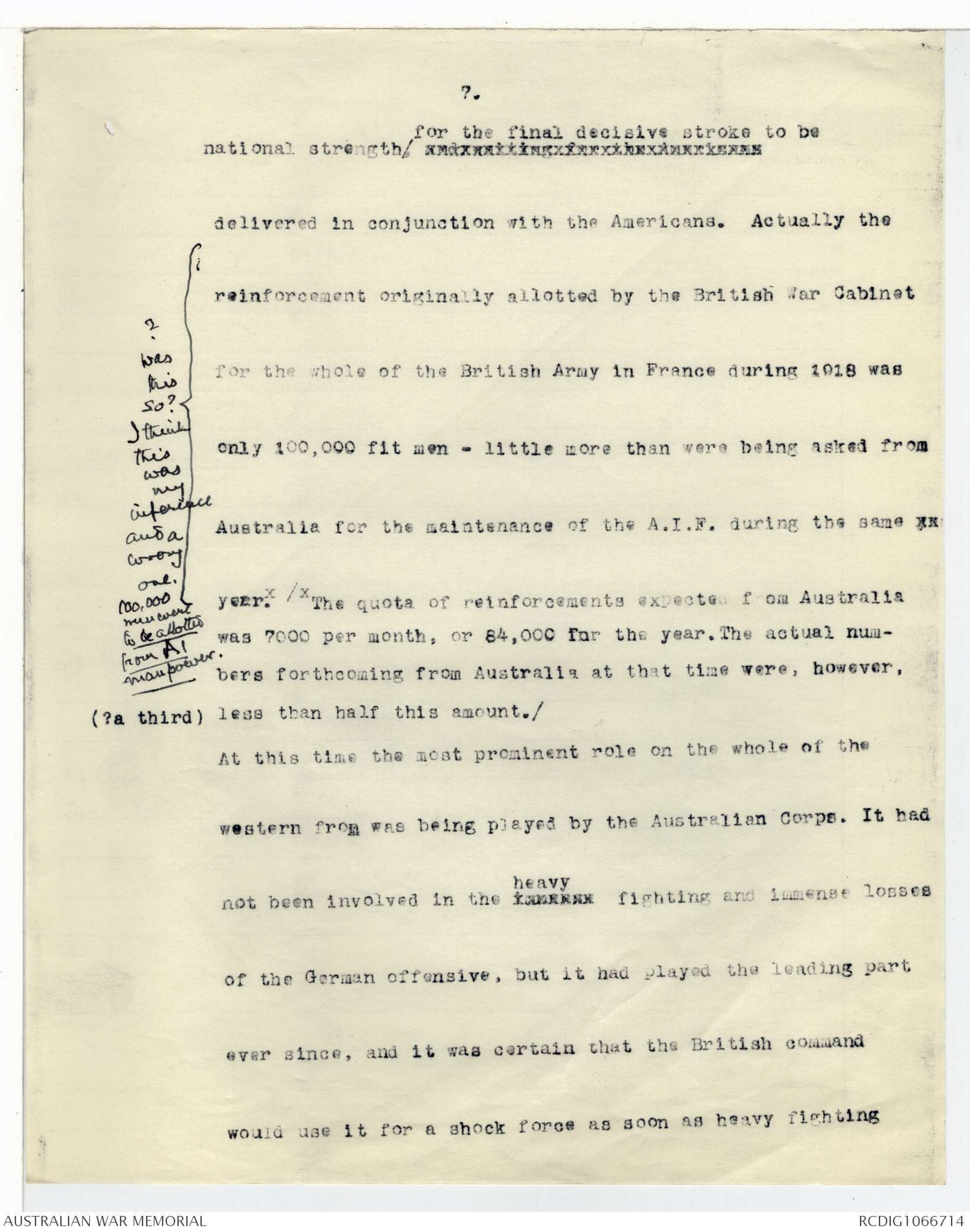
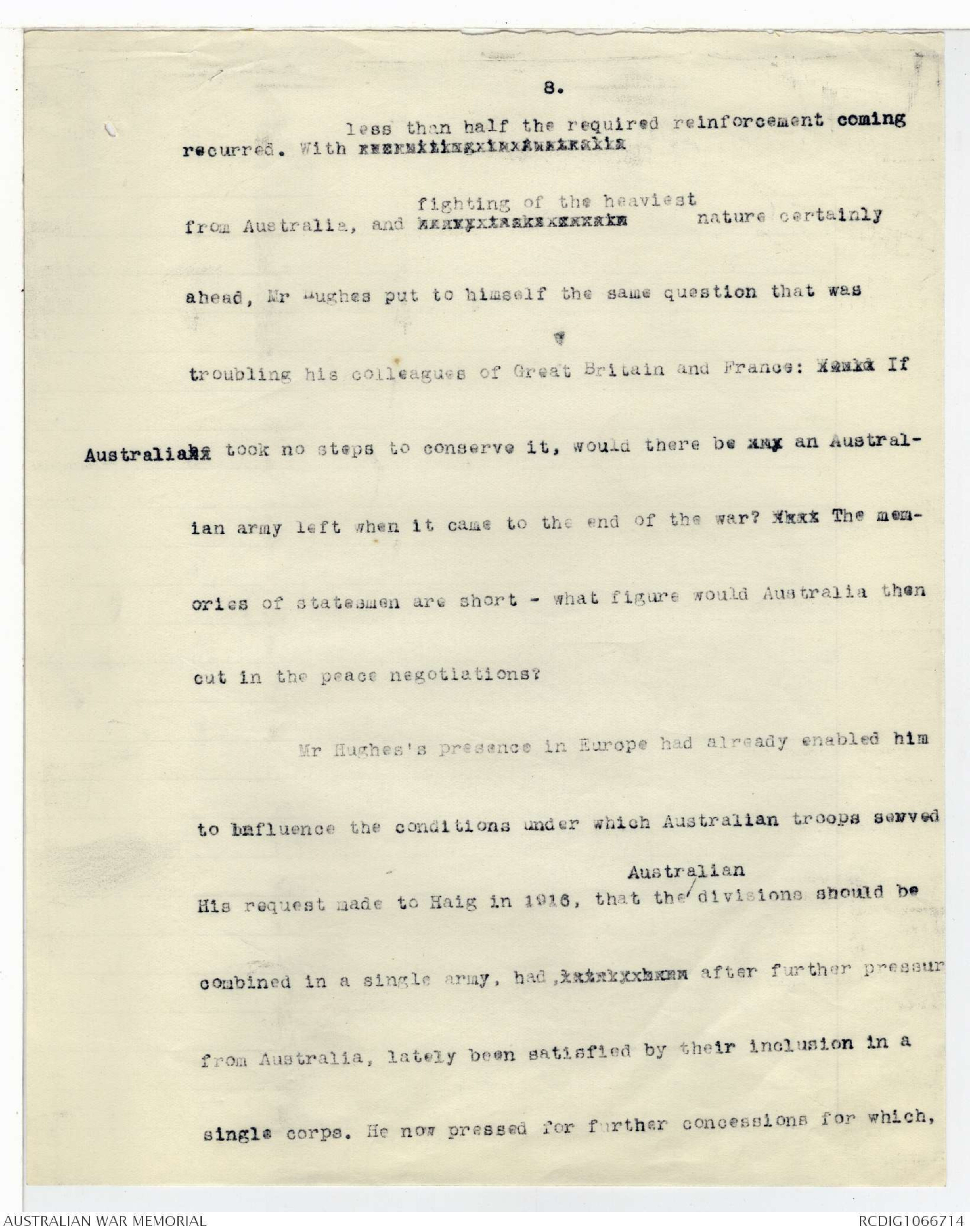
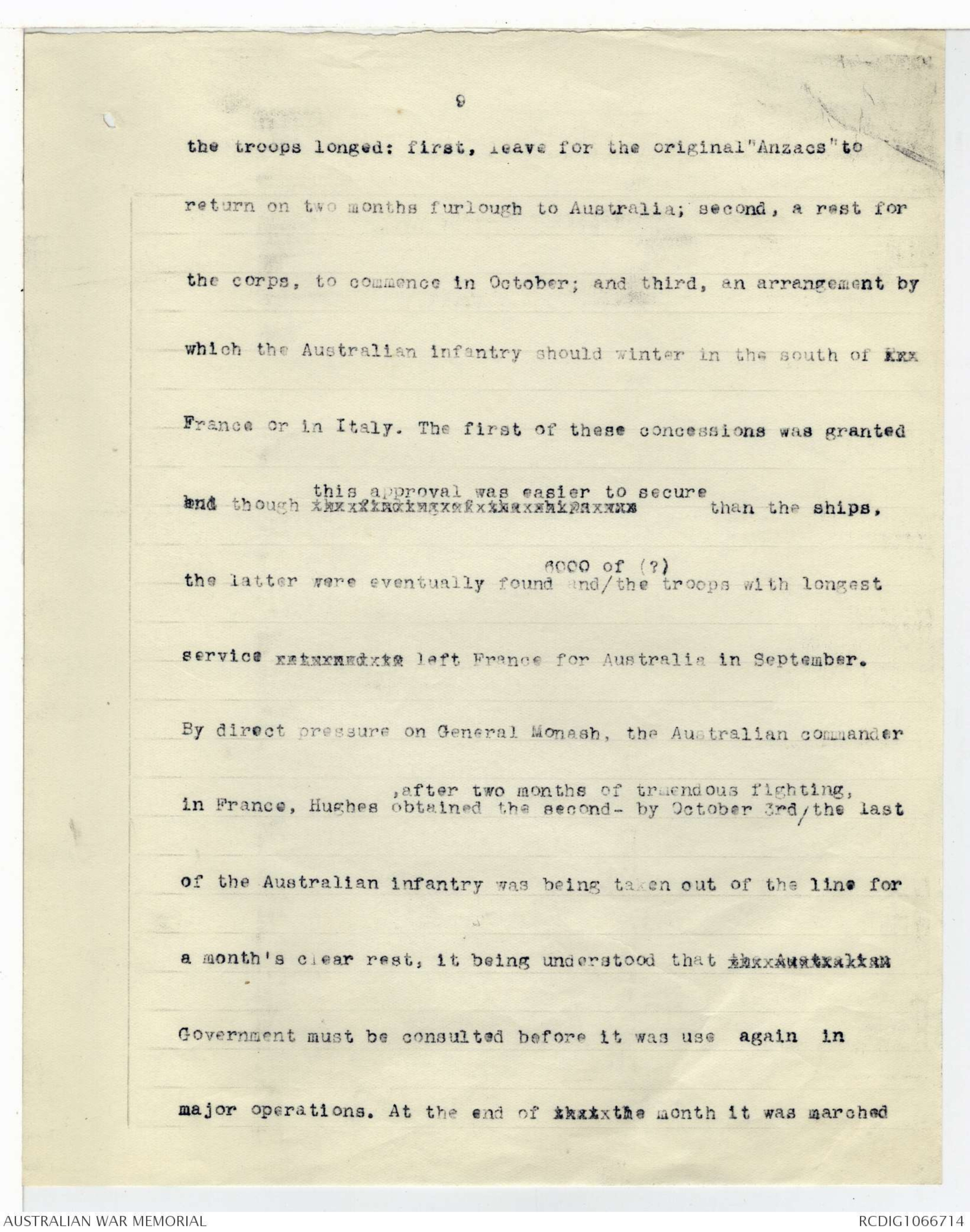
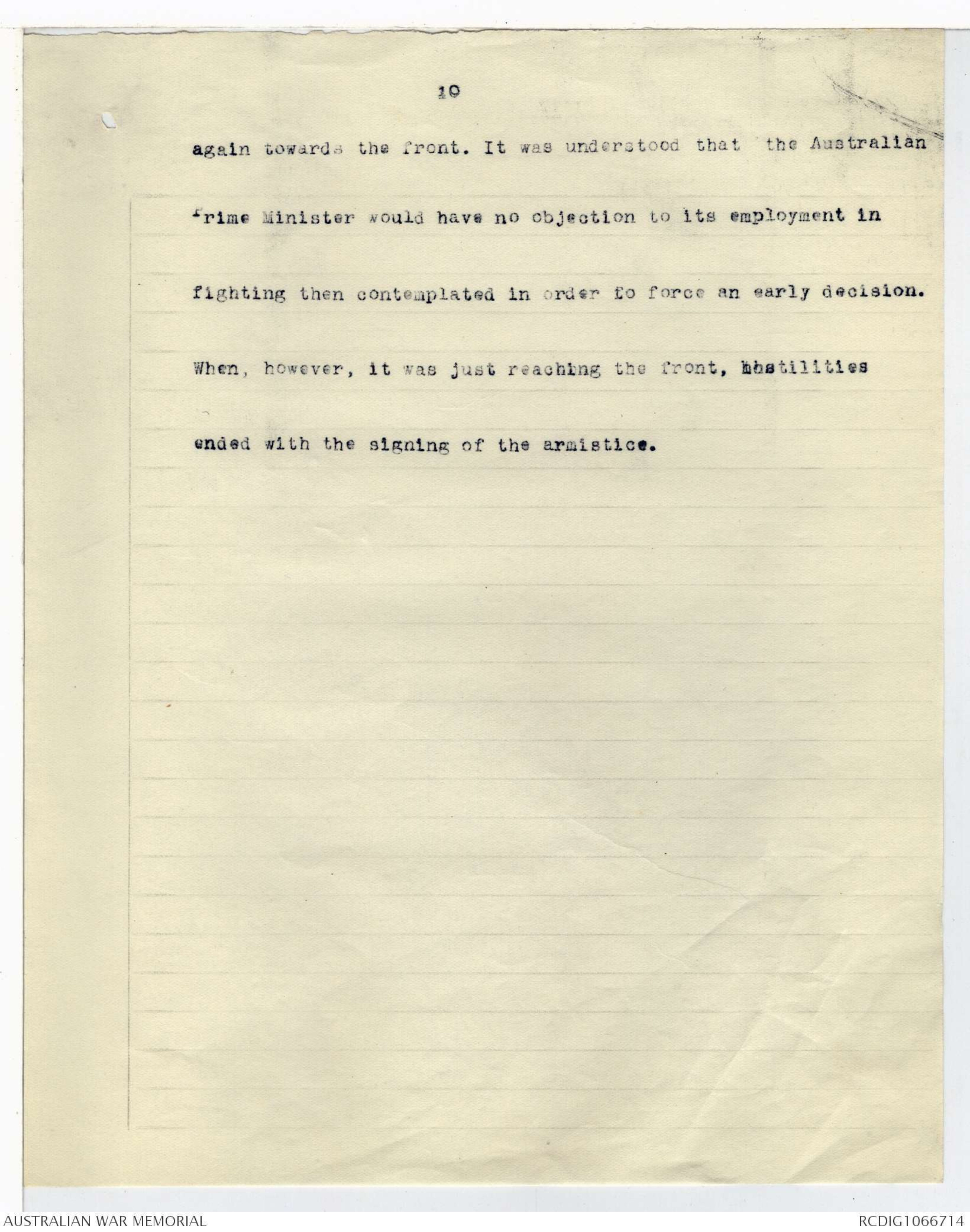
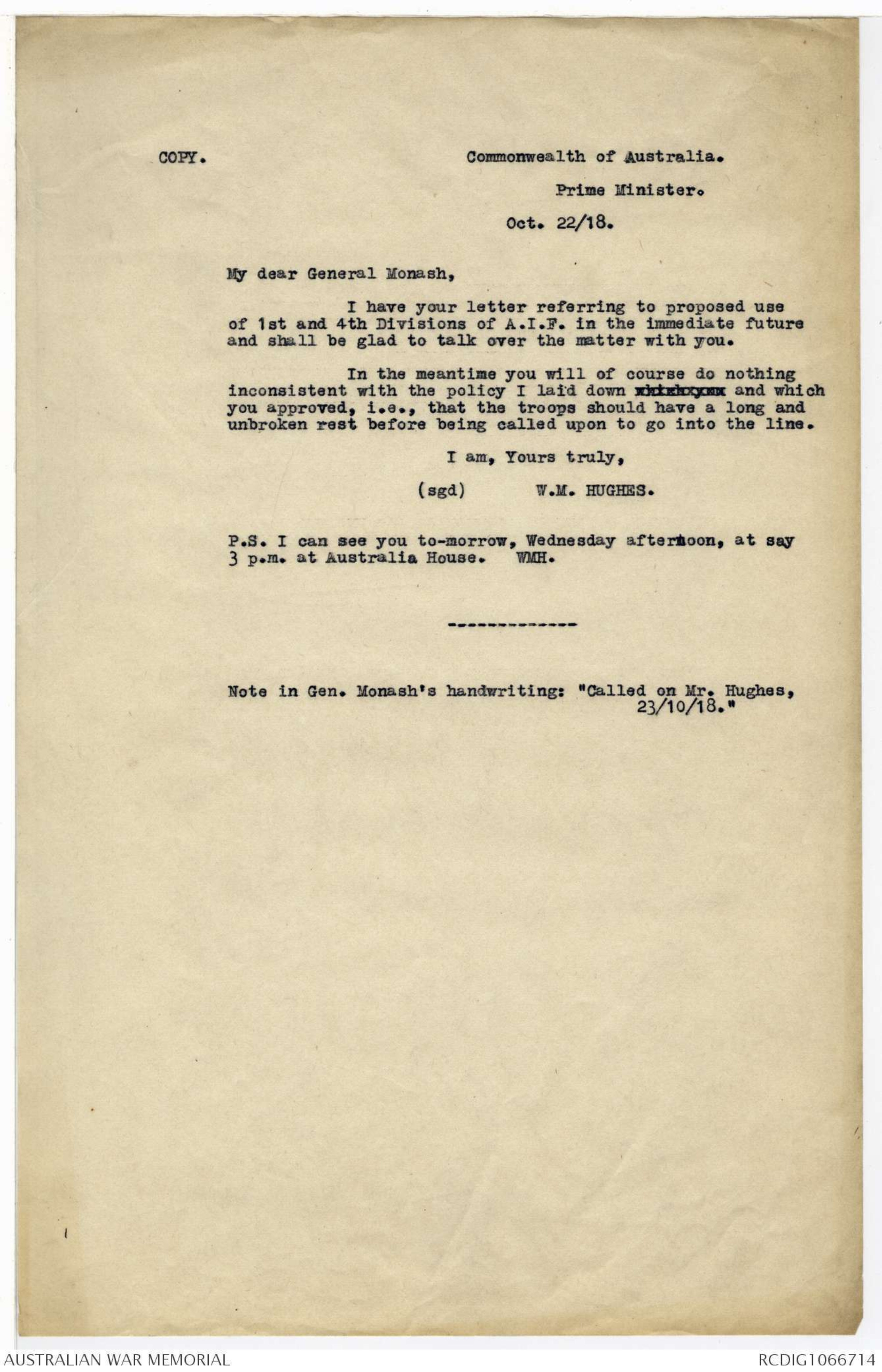
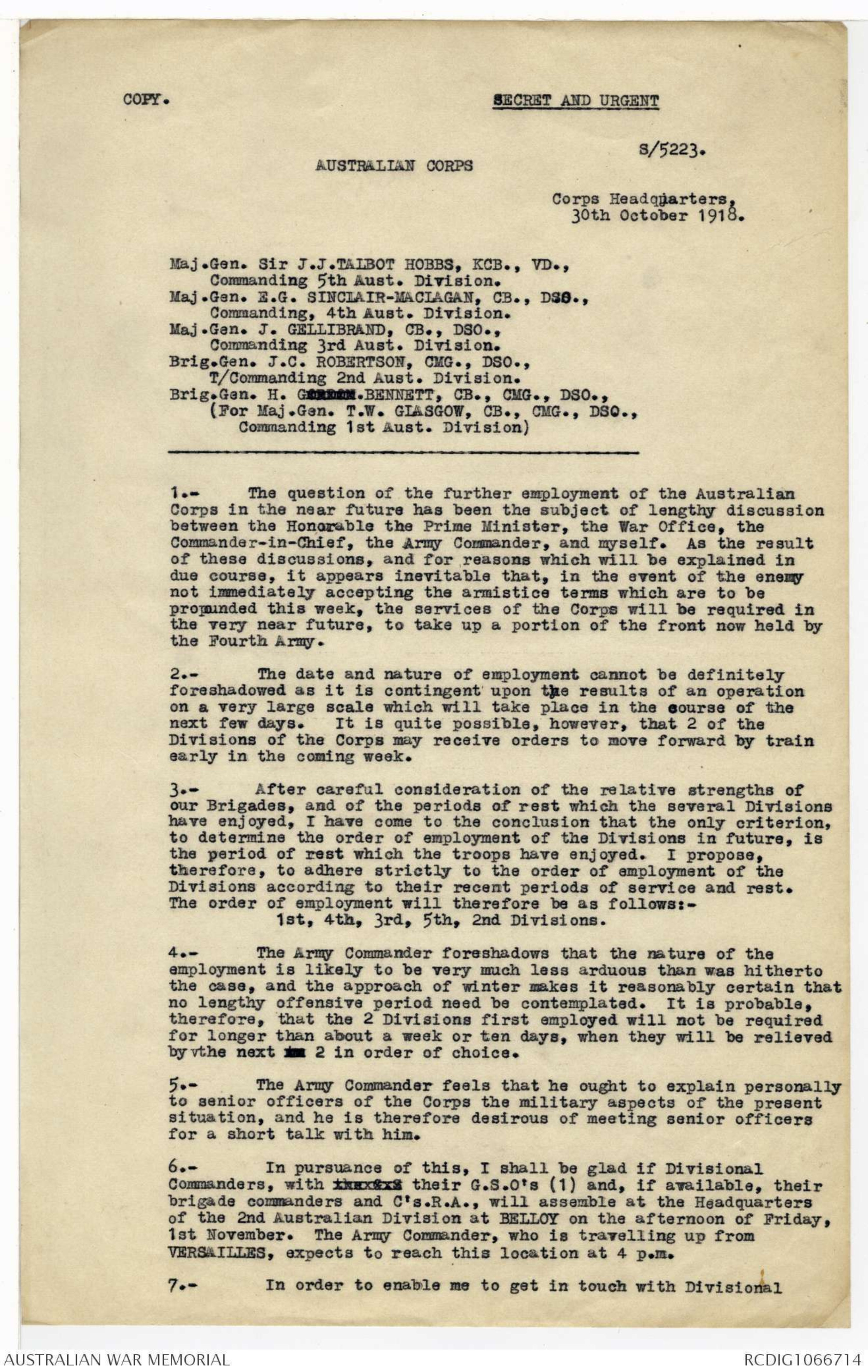
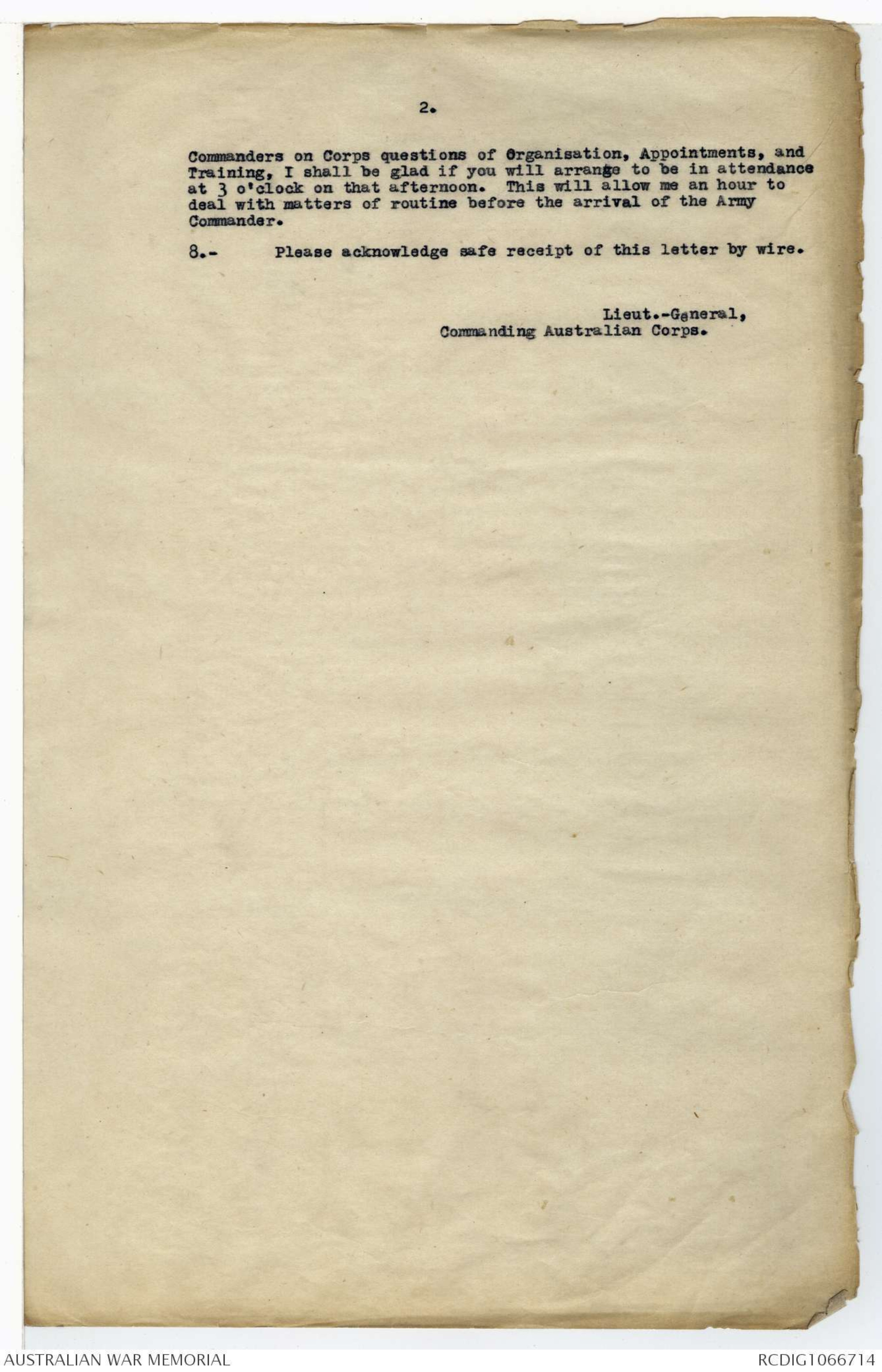
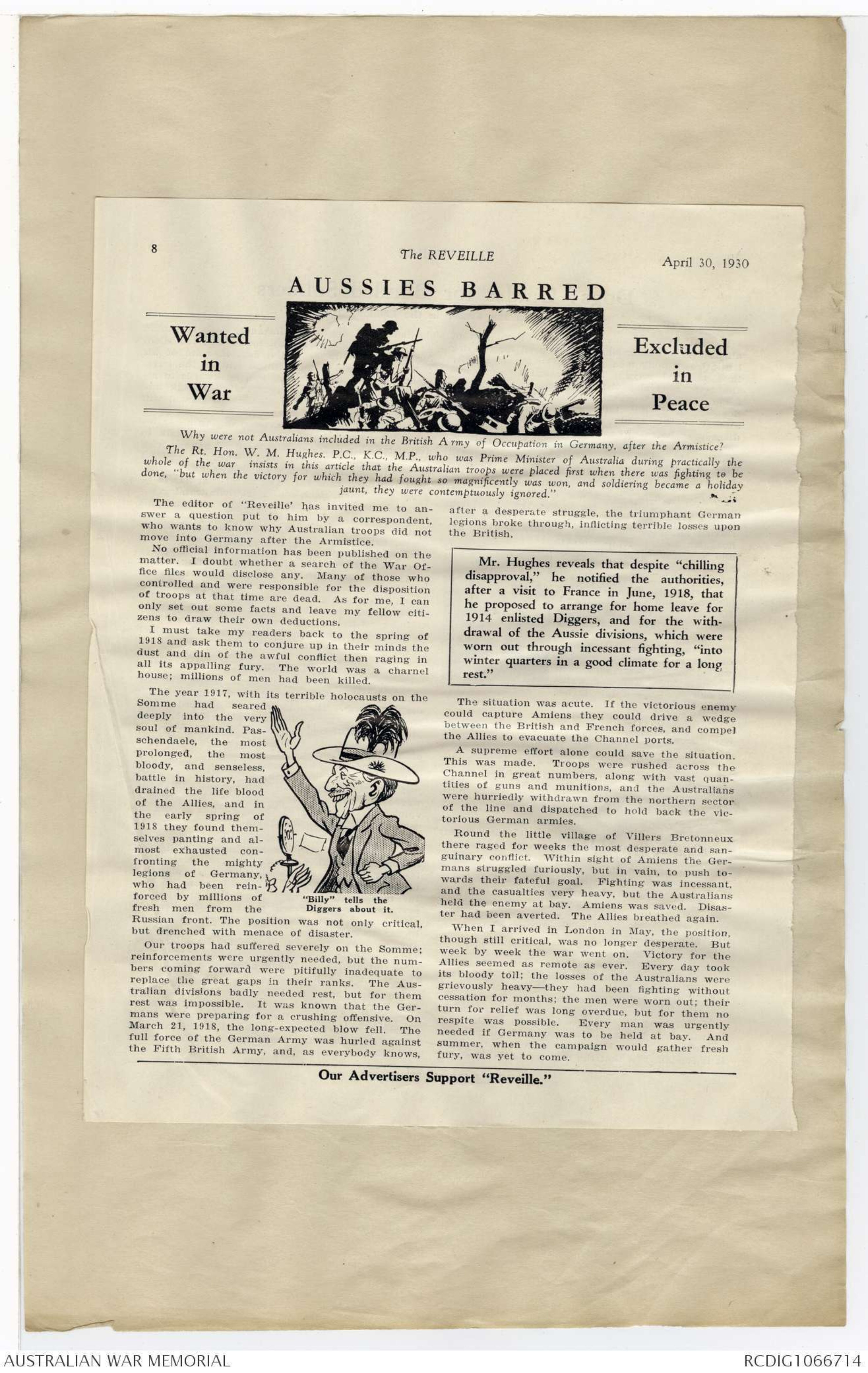
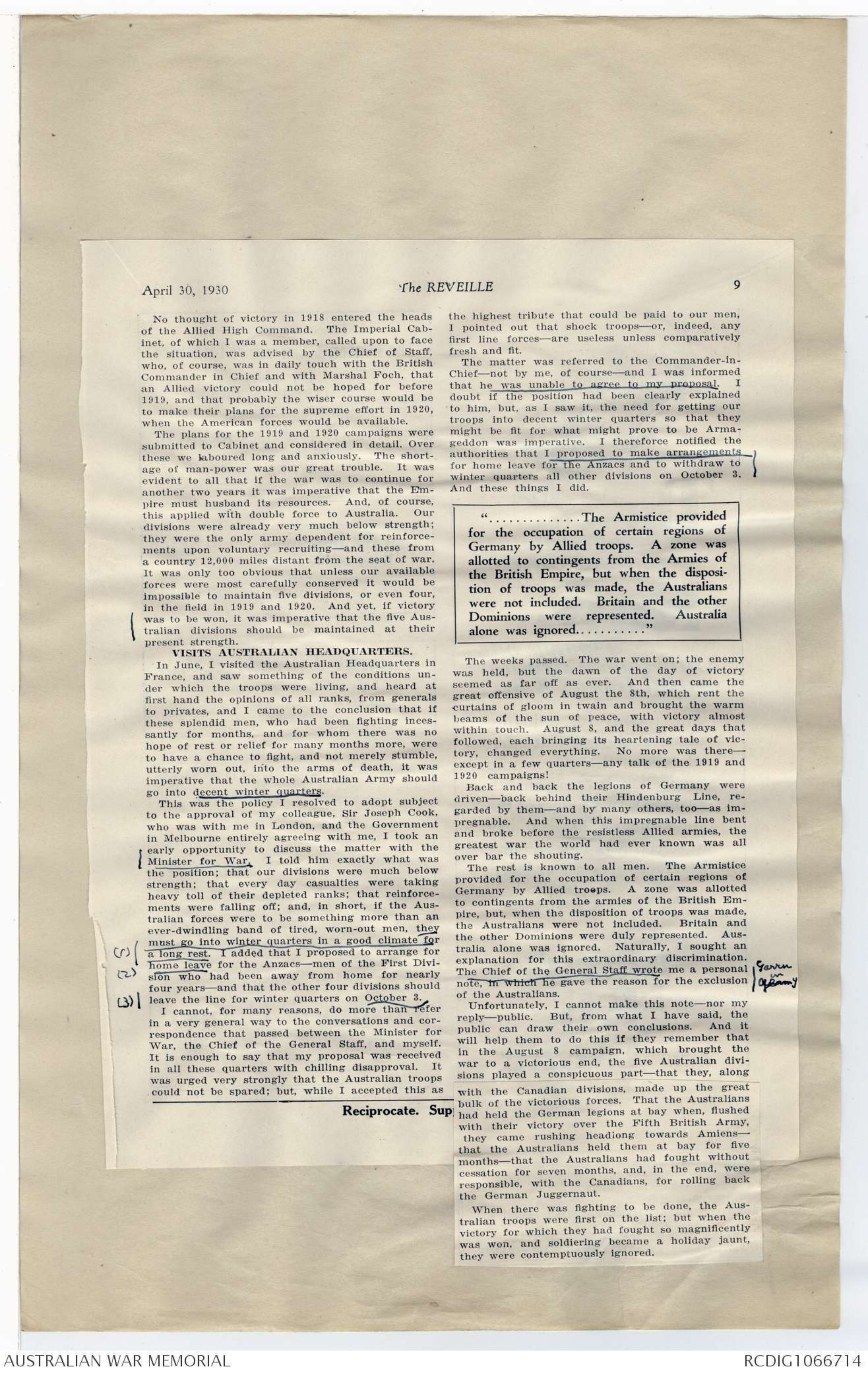
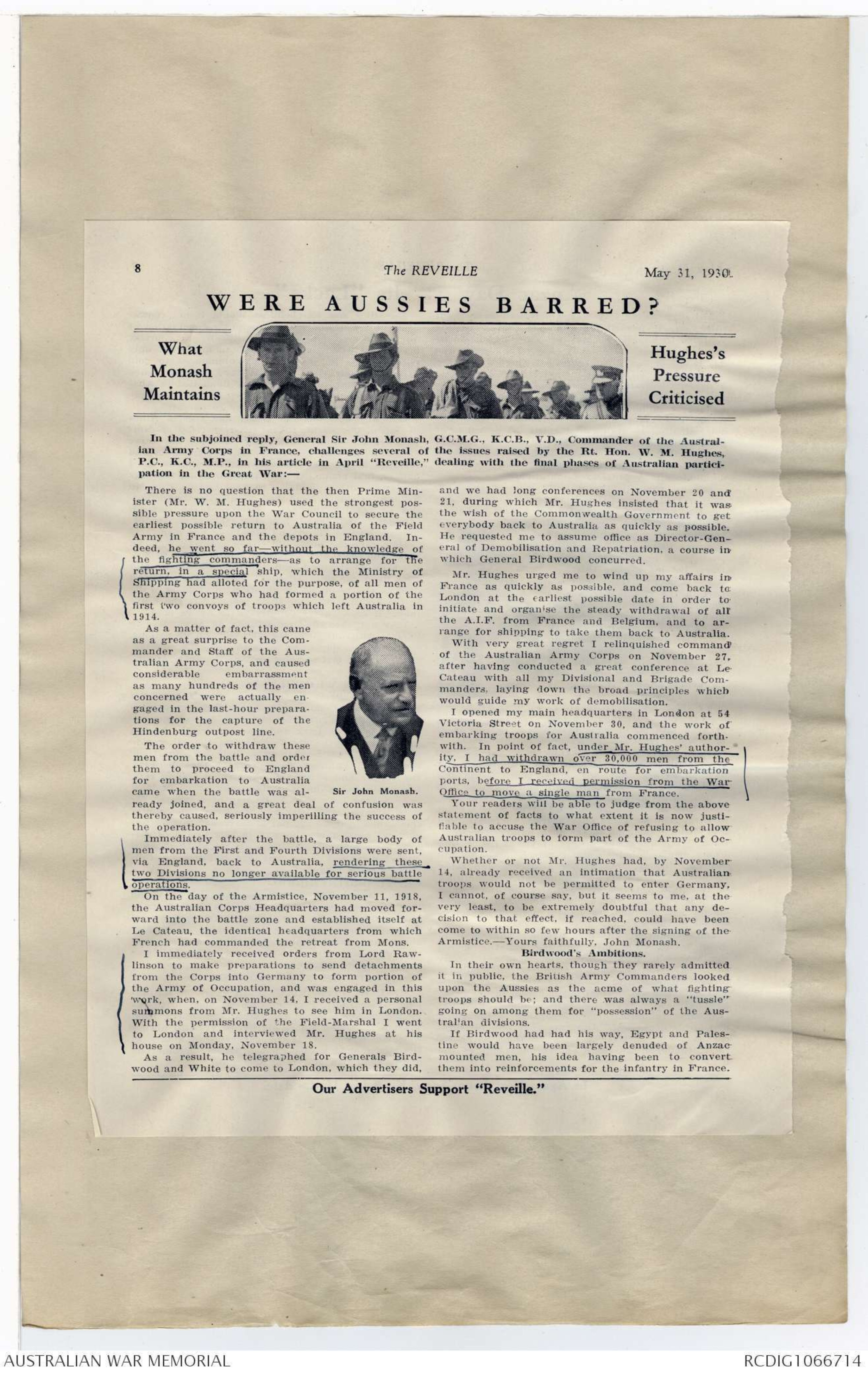
7.
national strength/ for the final decisive stroke to be and for the xxxxxxxxxx
delivered in conjunction with the Americans. Actually the
[*? was this so? I think this was my inference and a wrong one.
100,000 men were to be allotted from A1 manpower.*]
reinforcement originally allotted by the British War Cabinet
for the whole of the British Army in France during 1918 was
only 100,000 fit men - little more than were being asked from
Australia for the maintenance of the A.I.F. during the same xx
year. x/x The quota of reinforcements expected from Australia
was 7000 per month, or 84,000 for the year. The actual numbers
forthcoming from Australia at that time were, however,
[* (? a third) *] less than half this amount./
At this time the most prominent role on the whole of the
western fron was being played by the Australian Corps. It had
not been involved in the xxxxxxx ^heavy fighting and immense losses
of the German offensive, but it had played the leading part
ever since, and it was certain that the British command
would use it for a shock force as soon as heavy fighting
8.
recurred. With ^less than half the required reinforcement coming recruiting in Australia
from Australia, and ^fighting of the heaviest heavy tasks xxxxxin nature certainly
ahead, Mr Hughes put to himself the same question that was
troubling his colleagues of Great Britain and France: Would If
[* Australiaxx *] took no steps to conserve it, would there be any an Australian
army left when it came to the end of the war? What The memories
of statesmen are short - what figure would Australia then
cut in the peace negotiations?
Mr Hughes's presence in Europe had already enabled him
to influence the conditions under which Australian troops served
His request made to Haig in 1916, that the ^Australian divisions should be
combined in a simple army, had, lately been after further pressur
from Australia, lately been satisfied by their inclusion in a
single corps. He now pressed for further concessions for which,
9
the troops longed; first, leave for the original "Anzacs" to
return on two months furlough to Australia; second, a rest for
the corps, to commence in October; and third, an arrangement by
which the Australian infantry should winter in the south of xxx
France or in Italy. The first of these concessions was grantedbut though ^this approval was easier to secure the finding of the ships xxx than the ships,
the latter were eventually found and /6000 of (?) the troops with longest
service returned to left France for Australia in September.
By direct pressure on General Monash, the Australian commander
in France, Hughes, ^after two months of tremendous fighting, obtained the second - by October 3rd /, the last
of the Australian infantry was being taken out of the line for
a month's clear rest, it being understood that the Australian
Government must be consulted before it was use again in
major operations. At the end of thatthe month it was marched
10
again towards the front. It was understood that the Australian
Prime Minister should have no objection to its employment in
fighting then contemplated in order to force an early decision.
When, however, it was just reaching the front, hostilities
ended with the signing of the armistice.
COPY. Commonwealth of Australia.
Prime Minister.
Oct. 22/18.
My dear General Monash,
I have your letter referring to proposed use
of 1st and 4th Divisions of A.I.F. in the immediate future
and shall be glad to talk over the matter with you.
In the meantime you will of course do nothing
inconsistent with the policy I laid down which you and which
you approved, i.e., that the troops should have a long and
unbroken rest before being called upon to go into the line.
I am, Yours truly,
(sgd) W.M. HUGHES.
P.S. I can see you to-morrow, Wednesday afternoon, at say
3 p.m. at Australia House. WMH.
-------------
Note in Gen. Monash's handwriting: "Called on Mr. Hughes,
23/10/18."
COPY. SECRET AND URGENT
S/5223.
AUSTRALIAN CORPS
Corps Headquarters,
30th October 1918.
Maj.Gen. Sir J.J.TALBOT HOBBS, KCB., VD.,
Commanding 5th Aust. Division.
Maj.Gen. E.G. SINCALIR-MACLAGAN, CB., DSO.,
Commanding, 4th Aust. Division.
Maj.Gen. J. GELLIBRAND, CB., DSO.,
Commanding 3rd Aust. Division.
Brig.Gen. J.C. ROBERTSON, CMG., DSO.,
T/Commanding 2nd Aust. Division.
Brig.Gen. H. GXXXXX. BENNETT, CB., CMG., DSO.,
(For Maj.Gen. T.W. GLASGOW, CB., CMG., DSO.,
Commanding 1st Aust. Division)
1.- The question of the further employment of the Australian
Corps in the near future has been the subject of lengthy discussion
between the Honorable the Prime Minister, the War Office, the
Commander-in-Chief, the Army Commander, and myself. As the result
of these discussions, and for reasons which will be explained in
due course, it appears inevitable that, in the event of the enemy
not immediately accepting the armistice terms which are to be
propounded this week, the services of the Corps will be required in
the very near future, to take up a portion of the front now held by
the Fourth Army.
2.- The date and nature of employment cannot be definitely
foreshadowed as it is contingent upon the results of an operation
on a very large scale which will take place in the course of the
next few days. It is quite possible, however, that 2 of the
Divisions of the Corps may receive orders to move forward by train
early in the coming week.
3.- After careful consideration of the relative strengths of
our Brigades, and of the periods of rest which the several Divisions
have enjoyed, I have come to the conclusion that the only criterion,
to determine the order of employment of the Divisions in future, is
the period of rest which the troops have enjoyed. I propose,
therefore, to adhere strictly to the order of employment of the
Divisions according to their recent periods of service and rest.
The order of employment will therefore be as follows:-
1st, 4th, 3rd, 5th, 2nd Divisions.
4.- The Army Commander foreshadows that the nature of the
employment is likely to be very much less arduous than was hitherto
the case, and the approach of winter makes it reasonably certain that
no lengthy offensive period need be contemplated. It is probable,
therefore, that the 2 Divisions first employed will not be required
for longer than about a week or ten days, when they will be relieved
by vthe next xx 2 in order of choice.
5.- The Army Commander feels that he ought to explain personally
to senior officers of the Corps the military aspects of the present
situation, and he is therefore desirous of meeting senior officers
for a short talk with him.
6.- In pursuance of this, I shall be glad if Divisional
Commanders, with the G.S. their G.S.O's (1) and, if available, their
brigade commanders and C's.R.A., will assemble at the Headquarters
of the 2nd Australian Division at BELLOY on the afternoon of Friday,
1st November. The Army Commander, who is travelling up from
VERSAILLES, expects to reach this location at 4 p.m.
7.- In order to enable me to get in touch with Divisional
2.
Commanders on Corps questions of Organisation, Appointments, and
Training, I shall be glad if you will arrange to be in attendance
at 3 o'clock on that afternoon. This will allow me an hour to
deal with matters of routine before the arrival of the Army
Commander.
8.- Please acknowledge safe receipt of this letter by wire.
Lieut.-General,
Commanding Australian Corps.
8 The REVEILLE April 30, 1930
AUSSIES BARRED
Wanted
in
War
Printed Photo of Soldiers: see original document.
Excluded
in
Peace
Why were not Australians included in the British Army of Occupation in Germany, after the Armistice?
The Rt. Hon. W. M. Hughes, P.C., K.C., M.P., who was Prime Minister of Australia during practically the
whole of the war insists in this article that the Australian troops were placed first when there was fighting to be
done, "but when the victory for which they had fought so magnificently was won, and soldiering became a holiday
jaunt, they were contemptuously ignored."
The editor of "Reveille" has invited me to
answer a question put to him by a correspondent,
who wants to know why Australian troops did not
move into Germany after the Armistice.
No official information has been published on the
matter. I doubt whether a search of the War
Office files would disclose any. Many of those who
controlled and were responsible for the disposition
of troops at that time are dead. As for me, I can
only set out some facts and leave my fellow citizens
to draw their own deductions.
I must take my readers back to the spring of
1918 and ask them to conjure up in their minds the
dust and din of the awful conflict then raging in
all its appalling fury. The world was a charnel
house; millions of men been killed.
The year 1917, with its terrible holocausts on the
Somme had seared "Cartoon" captioned "Billy" tells the Diggers about it.': see original document
deeply into the very
soul of mankind.
Paschendaele, the most
prolonged, the most
bloody, and senseless,
battle in history, had
drained the life blood
of the Allies, and in
the early spring of
1918 they found
themselves panting and
almost exhausted
confronting the mighty
legions of Germany,
who had been
reinforced by millions of
fresh men from the
Russian front. The position was not only critical,
but drenched with menace of disaster.
Our troops had suffered severely on the Somme;
reinforcements were urgently needed, but the
numbers coming forward were pitifully inadequate to
replace the great gaps in their ranks. The
Australian divisions badly needed rest, but for them
rest was impossible. It was known that the
Germans were preparing for a crushing offensive. On
March 21, 1918, the long-expected blow fell. The
full force of the German Army was hurled against
the Fifth British Army, and, as everybody knows,
after a desperate struggle, the triumphant German
legions broke through, inflicting terrible losses upon
the British.
Passage inserted between text
*Mr Hughes reveals that despite "chilling
disapproval," he notified the authorities,
after a visit to France in June, 1918, that
he proposed to arrange for home leave for
1914 enlisted Diggers, and for the withdrawal
of the Aussie divisions, which were
worn out through incessant fighting, "into
winter quarters in a good climate for a long
rest."*
The situation was acute. If the victorious enemy
could capture Amiens they could drive a wedge
between the British and French forces, and compel
the Allies to evacuate the Channel ports.
A supreme effort alone could save the situation.
This was made. Troops were rushed across the
Channel in great numbers, along with vast
quantities of guns and munitions, and the Australians
were hurriedly withdrawn from the northern sector
of the line and dispatched to hold back the
victorious German armies.
Round the little village of Villers Bretonneux
there raged for weeks the most desperate and
sanguinary conflict. Within sight of Amiens the
Germans struggled furiously, but in vain, to push
towards their fateful goal. Fighting was incessant,
and the casualties very heavy, but the Australians
held the enemy at bay. Amiens was saved. Disaster
had been averted. The Allies breathed again.
When I arrived in London in May, the position,
though still critical, was no longer desperate. But
week by week the war went on. Victory for the
Allies seemed as remote as ever. Every day took
its bloody toll; the losses of the Australians were
grievously heavy—they had been fighting without
cessation for months; the men were worn out; their
turn for relief was long overdue, but for them no
respite was possible. Every man was urgently
needed if Germany was to be held at bay. And
summer, when the campaign would gather fresh
fury, was yet to come.
Our Advertisers Support "Reveille."
April 30, 1930 The REVEILLE 9
No thought of victory in 1918 entered the heads
of the Allied High Command. The Imperial
Cabinet, of which I was a member, called upon to face
the situation, was advised by the Chief of Staff,
who, of course, was in daily touch with the British
Commander in Chief and with Marshal Foch, that
an Allied victory could not be hoped for before
1919, and that probably the wiser course would be
to make plans for the supreme effort in 1920,
when the American forces would be available.
The plans for the 1919 and 1920 campaigns were
submitted to Cabinet and considered in detail. Over
these we laboured long and anxiously. The shortage
of man-power was our great trouble. It was
evident to all that if the war was to continue for
another two years it was imperative that the
Empire must husband its resources. And, of course,
this applied with double force to Australia. Our
divisions were already very much below strength;
they were the only army dependant for reinforcements
upon voluntary recruiting—and these from
a country 12,000 miles distant from the seat of war.
It was only too obvious that unless our available
forces were most carefully conserved it would be
impossible to maintain five divisions, or even four,
in the field in 1919 and 1920. And yet, if victory
was to be won, it was imperative that the five
Australian divisions should be maintained at their
present strength.
VISITS AUSTRALIAN HEADQUARTERS.
In June, I visited the Australian Headquarters in
France, and saw something of the conditions
under which the troops were living, and heard at
first hand the opinions of all ranks, from generals
to privates, and I came to the conclusion that if
these splendid men, who had been fighting
incessantly for months, and for whom there was no
hope of rest or relief for many months more, were
to have a chance to fight, and not merely stumble,
utterly worn out, into the arms of death, it was
imperative that the whole Australian Army should
go into decent winter quarters.
This was the policy I resolved to adopt subject
to the approval of my colleague, Sir Joseph Cook,
who was with me in London, and the Government
in Melbourne entirely agreeing with me. I took an
early opportunity to discuss the matter with the
Minister for War. I told him exactly what was
the position; that our divisions were much below
strength; that every day casualties were taking
heavy toll of their depleted ranks; that reinforcements
were falling off; and, in short, if the
Australian forces were to be something more than an
ever-dwindling band of tired, worn-out men, they
[*(1)*] must go into winter quarters in a good climate for
a long rest. I added that I proposed to arrange for
[*(2)*] home leave for the Anzacs—men of the First
Division who had been away from home for nearly
four years—and that the other four divisions should
[*(3)*] leave the line for winter quarters on October 3.
I cannot, for many reasons, do more than refer
in a very general way to the conversations and
correspondence that passed between the Minister for
War, the Chief of the General Staff, and myself.
It is enough to say that my proposal was received
in all these quarters with chilling disapproval. It
was urged very strongly that the Australian troops
could not be spared; but, I accepted this as
Reciprocate. Sup
the highest tribute that could be paid to our men.
I pointed out that shock troops—or, indeed, any
first line forces—are useless unless comparatively
fresh and fit.
The matter was referred to the Commander-In-
Chief—not by me, of course—and I was informed
that he was unable to agree to my proposal. I
doubt if the position had been clearly explained
to him, but, as I saw it, the need for getting our
troops into decent winter quarters so that they
might be fit for what might prove to be Armageddon
was imperative. I thereforce notified the
authorities that I proposed to make arrangements
for home leave for the Anzacs and to withdraw to
winter quarters all other divisions on October 3.
And these things I did.
Passage inserted between text.
*"..............The Armistice provided
for the occupation of certain regions of
Germany by Allied troops. A zone was
allotted to contingents from the Armies of
the British Empire, but when the disposition
of troops was made, the Australians
were not included. Britain and the other
Dominions were represented. Australia
alone was ignored.........."*
The weeks passed. The war went on; the enemy
was held, but the dawn of the day of victory
seemed as far off as ever. And then came the
greatest offensive of August the 8th, which rent the
curtains of gloom in twain and brought the warm
beams of the sun of peace, with victory almost
within touch. August 8, and the great days that
followed, each bringing its heartening tale of
victory, changed everything. No more was there—
except in a few quarters—any talk of the 1919 and
1920 campaigns!
Back and back the legions of Germany were
driven—back behind their Hindenburg Line,
regarded by them—and by many others, too—as
impregnable. And when this impregnable line bent
and broke before the resistless Allied armies, the
greatest war the world had ever known was all
over bar the shouting.
The rest is known to all men. The Armistice
provided for the occupation of certain regions of
Germany by Allied troops. A zone was allotted
to contingents from the armies of the British
Empire, but, when the disposition of troops was made,
the Australians were not included. Britain and
the other Dominions were duly represented.
Australia alone was ignored. Naturally, I sought an
explanation for this extraordinary discrimination.
The Chief of the General Staff wrote me a personal
note, in which he gave the reason for the exclusion
of the Australians. [[*?Garrison?*]] in [[*?Germany?*]]
Unfortunately, I cannot make this note—nor my
reply—public. But, from what I have said, the
public can draw their own conclusions. And it
will help them to do this if they remember that
in the August 8 campaign, which brought the
war to a victorious end, the five Australian
divisions played a conspicuous part—that they, along
with the Canadian divisions, made up the great
bulk of the victorious forces. That the Australians
had held the German legions at bay when, flushed
with their victory over the Fifth British Army,
they came rushing headlong towards Amiens—
that the Australians held them at bay for five
months—that the Australians had fought without
cessation for seven months, and, in the end. were
responsible, with the Canadians, for rolling back
the German Juggernaut.
When there was fighting to be done, the
Australian troops were first on the list; but when the
victory for which they had fought so magnificently
was won, and soldiering became a holiday jaunt,
they were contemptuously ignored.
8 The REVEILLE May 31, 1930.
WERE AUSSIES BARRED?
What
Monash
Maintains
Printed Photo of Soldiers: see original document.
Hughes's
Pressure
Criticised
In the subjoined reply, General Sir John Monash, G.C.M.G., K.C.B., V.D., Commander of the Australian
Army Corps in France, challenges several of the issues raised by the Rt. Hon. W. M. Hughes,
P.C., K.C., M.P., in the article in April "Reveille," dealing with the final phases of Australian
participation in the Great War:-
There is no question that the then Prime
Minister (Mr. W. M. Hughes) used the strongest
possible pressure upon the War Council to secure the
earliest possible return to Australia of the Field
Army in France and the depots in England.
Indeed, he went so far—without the knowledge of
the fighting commanders—as to arrange for the
return, in a special ship, which the Ministry of
Shipping had alloted for the purpose, of all men of
the Army Corps who had formed a portion of the
first two convoys of troops which left Australia in
1914.
As a matter of fact, this came
as a great surprise to the
Commander and Staff of the
Australian Army Corps, and caused
considerable embarrassment Photo of Sir John Monash: see
as many hundreds of the men original document.
concerned were actually
engaged in the last-hour preparations
for the capture of the
Hindenburg outpost line.
The order to withdraw these
men from the battle and order
them to proceed to England
for embarkation to Australia
came when the battle was
already joined, and a great deal of confusion was
thereby caused, seriously imperilling the success of
the operation.
Immediately after the battle, a large body of
men from the First and Fourth Divisions were sent
via England, back to Australia, rendering these
two Divisions no longer available for serious battle
operations.
On the day of the Armistice, November 11, 1918,
the Australian Corps Headquarters had moved
forward into the battle zone and established itself at
Le Cateau, the identical headquarters from which
French had commanded the retreat from Mons.
I immediately received orders from Lord
Rawlinson to make preparations to send detachments
from the Corps into Germany to form portion of
the Army of Occupation, and was engaged in this
work when, on November 14, I received a personal
summons from Mr. Hughes to see him in London.
With the permission of the Field-Marshal I went
to London and interviewed Mr Hughes at his
house on Monday, November 18.
As a result, he telegraphed for Generals Birdwood
and White to come to London, which they did,
and we had long conferences on November 20 and
21, during which Mr. Hughes insisted that it was
the wish of the Commonwealth Government to get
everybody back to Australia as quickly as possible.
He requested me to assume office as Director-General
of Demobilisation and Repatriation, a course in
which General Birdwood concurred.
Mr. Hughes urged me to wind up my affairs in
France as quickly as possible, and come back to
London at the earliest possible date in order to
initiate and organise the steady withdrawal of all
the A.I.F. from France and Belgium, and to
arrange for shipping to take them back to Australia.
With very great regret I relinquished command
of the Australian Army Corps on November 27,
after having conducted a great conference at Le
Cateau with all my Divisional and Brigade
Commanders, laying down the broad principles which
would guide my work of demobilisation.
I opened my main headquarters in London at 54
Victoria Street on November 30, and the work of
embarking troops for Australia commenced forthwith.
In point of fact, under Mr. Hughes' authority,
I had withdrawn over 30,000 men from the
Continent to England, en route for embarkation
ports, before I received permission from the War
Office to move a single man from France.
Your readers will be able to judge from the above
statement of facts to what extent it is now
justifiable to accuse the War Office of refusing to allow
Australian troops to form part of the Army of
Occupation.
Whether or not Mr. Hughes had, by November
14, already received an intimation that Australian
troops would not be permitted to enter Germany.
I cannot, of course say, but it seems to me, at the
very least, to be extremely doubtful that any
decision to that effect, if reached, could have been
come to within so few hours after the signing of the
Armistice.—Yours faithfully, John Monash.
Birdwood's Ambitions.
In their own hearts, though they rarely admitted
it in public, the British Army Commanders looked
upon the Aussies as the acme of what fighting
troops should be; and there was always a "tussle"
going on among them for "possession" of the
Australian divisions.
If Birdwood had had his way, Egypt and Palestine
would have been largely denuded of Anzac
mounted men, his idea having been to convert
them into reinforcements for the infantry in France.
Our Advertisers Support "Reveille."
 Not Yet Replaced By AI
Not Yet Replaced By AIThis transcription item is now locked to you for editing. To release the lock either Save your changes or Cancel.
This lock will be automatically released after 60 minutes of inactivity.